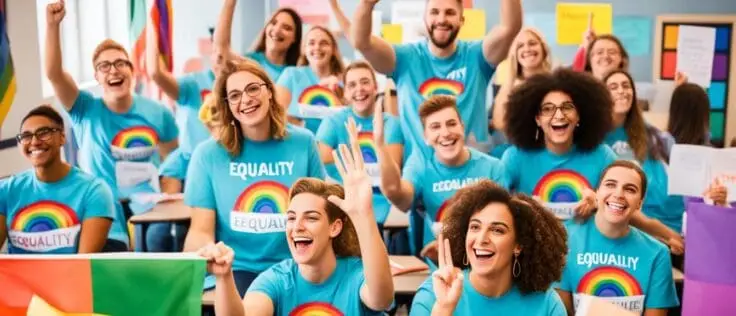How can today’s schools better prepare the next generation to embrace diversity and inclusivity in every aspect of their lives?
As societal attitudes shift, it’s essential to include LGBTQ+ topics in UK school curricula. This inclusive education fosters a more accepting atmosphere for everyone. It boosts youth awareness and combats stereotypes from an early age.
Fostering understanding among peers, LGBTQ+ education is more crucial than ever. These discussions in classrooms help students appreciate the diverse world. They also gain the tools to become compassionate citizens.
Introduction: The Importance of LGBTQ+ Education
In recent years, LGBTQ+ education’s importance in UK schools has grown. It promotes inclusive education, aiming for a respectful and welcoming atmosphere for everyone. Effective LGBTQ+ awareness teaches acceptance, cuts down bullying, and informs all students about diversity.
New laws from September 2020 show this educational reform‘s progress. Primary schools now must discuss diverse family structures, including LGBTQ+ ones. Secondary schools cover sexual orientation and gender identity. Parkfield Community School has been highlighted by Ofsted for promoting tolerance excellently with their No Outsiders programme.
Yet, not everyone agrees. Protests at Parkfield Community School and debates like those on BBC’s Question Time show the challenges faced. Still, most Members of Parliament and the public support LGBTQ+ awareness and inclusivity.
Talking about these issues early on breaks down prejudice. UK school reforms aim for a space where everyone is supported. This helps shape a future that respects all types of human diversity.
Overcoming Section 28: Past Challenges and Progress
Section 28 was a tough law that hit the UK’s stance on LGBTQ+ rights and school rules hard. It lasted from 1988 to 2000 in Scotland and until 2003 in England and Wales. It banned local authorities from “promoting” homosexuality, stopping any talk on LGBTQ+ issues in schools.
Section 28 brought along big struggles for LGBTQ+ rights in education. One time, a teacher made hurtful, anti-gay remarks in class. This law painted the LGBTQ+ community negatively. It made it hard for teachers to help students who were figuring out who they were.
But people in Britain fought against this unfair rule. On February 20, 1988, a huge crowd of over 20,000 protested against Section 28 in Manchester. Their fight paid off when the law was finally scrapped in 2003. This was a big win for LGBTQ+ rights and how schools worked.
Since then, we’ve seen great strides towards better LGBTQ+ acceptance in schools. 2015 was a standout year for making schools more welcoming. Diversity Role Models started workshops to fight old, hateful views. The push to stop conversion therapy in 2018 shows we’re serious about making schools safer for everyone.
In 2023, Prime Minister Rishi Sunak promised new guidelines to help schools with gender identity issues. It’s part of our effort to keep improving our schools. The saying “Nothing about us without us” at Manchester Pride Human Rights Forum stresses the need for laws that include everyone’s voice.
Looking back from Section 28’s harsh days to now, we’ve come a long way towards acceptance and understanding. We must keep teaching and empowering our youth. Our goal is to ensure schools are a place where everyone can feel accepted and valued.
Current LGBTQ+ Inclusivity in UK Schools
School diversity in the UK has changed a lot recently. A big change came in April 2019 with new rules for Relationships and Sex Education (RSE). From September 2020, secondary schools must teach RSE. Primary schools have to teach Relationships Education. This helps students understand different family structures, including LGBTQ+ ones.
Still, almost half of LGBT students face bullying in schools. This shows the need for education that teaches tolerance and respect. Most people in Britain agree. They support talking positively about different families, including LGBTQ+ ones, in primary schools.
Even before these rules, many schools had LGBTQ-inclusive lessons. Over 600 faith schools in England are also committed to being LGBTQ-inclusive. This shows a big move towards diversity and acceptance in schools.
Educational practices are changing, supported by new laws. Almost all MPs agree with the new RSE rules. The curriculum now covers sexual orientation and gender identity. However, parents can still choose to keep their children out of some Sex Education lessons. Teachers believe in having age-appropriate talks about relationships and diversity.
Sexual health professionals and education consultants are also important. They train others to tackle these subjects with tolerance and respect. By having open and respectful talks about LGBTQ+ inclusivity, schools are becoming more welcoming for everyone.
UK schools are at the forefront of including LGBTQ+ themes in education. They are making diversity a real part of school life, not just a goal.
Strategies for Implementing LGBTQ+ Education
Inclusion and support in schools mean integrating LGBTQ+ topics into the curriculum. This requires careful lesson planning and picking the right resources. Our aim? To offer a broad education that mirrors our diverse society, and to nurture understanding and acceptance.
Many LGBTQ+ students face bullying and discrimination, hurting their mental health. Schools must use proven anti-bullying programmes that focus on these issues. They should also have clear policies against LGBTQ+ discrimination. This makes sure every student finds a safe and welcoming space at school.
It’s also key for schools to work with LGBTQ+ students and their families. Getting their feedback helps make school inclusion efforts better. This makes LGBTQ+ students feel valued and helps their school performance. It ensures their views shape school policies, making them more relevant and effective.
Integrating LGBTQ+ topics throughout the curriculum is essential. We can include positive LGBTQ+ role models in history and literature. Or offer lessons on sexuality and gender in health and social studies. This way, schools give students the tools they need for both academic and personal growth.
Schools need to provide ready access to LGBTQ+ friendly counselling and mental health services. Tackling issues like depression and anxiety head-on can save lives. LGBTQ+ youths face these at much higher rates than their peers. Support services can really make a difference.
To wrap up, using educational strategies that include LGBTQ+ content and support is key to creating welcoming schools. Such efforts not only fight bullying and discrimination but also give all students the chance to succeed in a diverse world.
The Role of Teachers and Educators
Teachers play a key role in creating open classrooms for everyone. Their job is not just about teaching stuff. They plan and prepare lessons carefully to make learning deep and meaningful. Besides, they develop new materials to keep up with the latest in education. It’s also important for them to track how students are doing and give helpful feedback.
Educators support a positive learning space through constant growth and research. They adapt to diverse learning needs, making sure all students feel valued. Getting students actively involved is key for a lively classroom, which boosts learning for everyone.
Teachers also focus on sharpening students’ critical thinking, encouraging innovation. They inspire not just students but their families too, to love learning and grow personally. By keeping open lines of communication with everyone involved, they help build a supportive and inclusive learning atmosphere.
Moreover, they reach out to communities, creating links that support students’ education and societal health. Education is evolving, with teachers working closely with students and respecting various cultures. They’ve moved from traditional teaching to being guides, making learning more active.
Adapting to new tech is now part of teaching, showing how vital teachers are in these changes. Schools try different ways to help teachers, like changing schedules. Teachers lead various initiatives, mentor new ones, and push for inclusive learning places. They are crucial in preparing young minds for the future.
Student Perspectives on LGBTQ+ Education
Understanding the views of students is essential in measuring the real impact of LGBTQ+ education. Take Landon Callahan’s story, for instance. It highlights the struggles faced by students regarding their gender identity. He found out he was transgender in high school. He started his social transition in his first year after battling severe mental health issues. Issues like anxiety, panic attacks, and depression were part of his struggle with identity.
Stories like Callahan’s show the challenges many LGBTQ+ students face daily. For example, only 20.6% of transgender students feel fully safe at school. This is much lower than the 43% of heterosexual students who feel safe. These facts show the urgent need for better support systems in schools. Once, Callahan had to use the nurse’s bathroom, showing the small but significant difficulties encountered.
Inclusive education that embraces LGBTQ+ student voices is crucial. Esmée Silverman’s experience brings attention to the impact on mental health for LGBTQ+ youth. She thought about suicide often during her early high school years. The support from her school’s Gay-Straight Alliance was a crucial lifeline for her. It gave her hope and made her feel less alone.

Stories from students like Callahan and Silverman highlight the benefits of inclusive LGBTQ+ education. Having things like gender-neutral bathrooms and inclusive lessons can lower suicide risks among these students. Their stories argue for more caring and supportive school environments. It shows that teaching about LGBTQ+ issues should go beyond awareness. It should include real, helpful support.
These students’ experiences offer hope amidst the struggles. With the right support, mental health can get better. Taking steps to create a more inclusive and understanding school environment helps everyone. It encourages a new generation to embrace diversity and acceptance.
Case Case Study: University of Houston’s Introduction to LGBT Studies
The University of Houston offers a special course named Intro to LGBT Studies, or GLBT 2360. It’s a shining example of inclusivity in education, giving students 3.00 credit hours at the sophomore level. The class not only boosts critical thinking and communication but also focuses on social and personal responsibility. Students must complete prerequisites like ENGL 1304 to join, ensuring they’re ready for the challenges.
Every student in this course will write a four-page paper and a three-page paper. These assignments help them explore the LGBT community’s history and current issues. It’s interesting to note the shift from using “Gender Identity Disorder” in the DSM-III to “gender dysphoria” in the DSM-V. The lectures often discuss how society and medicine view gender and sexuality.
The University of Houston values inclusivity, showing it through their LGBT studies programme. They review the course every five years and ensure it’s taught regularly. The program’s popularity shows the importance of LGBT studies in universities. Yet, teachers face a challenge in balancing non-binary and traditional educational structures, with 55% feeling this pressure. Despite advances, gender expansive youth still face significant discrimination.
In 1973, the American Psychiatric Association made a huge step by not seeing homosexuality as a mental issue. But, challenges remain for gender expansiveness, even after historical setbacks like Eisenhower’s executive order 10450 that lasted until 1993. Over two years, the Youth and Gender Media Project has run workshops. These help to educate and support both students and teachers.
Resources for Teaching LGBTQ+ Topics
There are lots of educational materials to help teach LGBTQ+ subjects. Organisations like JustLikeUs offer a free kit for schools. This includes a wide variety of LGBTQ+ teaching aids.
The Trevor Project provides essential crisis support for LGBTQ youth all the time. Stonewall and YoungMinds offer an e-Learning course to boost mental health for LGBTQ+ youngsters.
The Anna Freud Centre gives news you can use in schools to assist LGBTQI+ kids. They also guide on supporting young ones exploring their gender identity.
Schools Out UK fights to make schools safe for LGBT+ people. It runs LGBT History Month in the UK to teach about LGBT history and issues.
ThinkuKnow guides on keeping LGBTQ+ youth safe online, a must in our digital world. For LGBTQ+ youth in care, there are specialized resources like toolkits for trans youth, foster carers, and videos.
Stonewall has lots of resources for LGBTQ+ students, covering support for SEND students too. These are useful for various educational levels, from young kids to older students.
Lesson plans cover LGBT rights figures, both past and present. They tackle topics like prejudice, hate crimes, and mental health. Maths worksheets on topics like algebra and angles ensure LGBTQ+ themes fit into different lessons.
Films used in these lesson plans are suitable for different ages, like 12 or 15. The resources, including books, films, and workshops, focus on promoting equality and understanding. They encourage students to think deeply about discrimination and inequality.
Inclusive Representation in School Activities and Media
It is crucial that students feel welcomed and accepted at school. They need to see their lives mirrored in school media and activities. This boosts LGBTQ+ visibility and fights prejudice, creating an inclusive atmosphere.
To narrow education’s opportunity gap, we must tackle systemic inequalities. Inclusive media offers diverse viewpoints. It teaches respect for different cultures and identities. This kind of representation in schools educates students about the world’s diversity.

Diverse and inclusive school events are key in promoting representation. Celebrating events like Pride Month and diversity days helps. They give students a way to learn about and express various identities. Talking about LGBTQ+ topics in assemblies and classes also helps everyone understand and accept these identities.
Furthermore, diversity in education leads to fair learning spaces where all students feel important. Training teachers in inclusive practices is crucial. Due to a lack of trained teachers, it’s more important than ever. They can then include LGBTQ+ perspectives in school, enhancing visibility.
Inclusive representation is more than just curriculum. It’s about the entire school environment. Media and activities in schools should support and promote understanding. By focusing on inclusive media and representation, we make schools a place where every student is acknowledged and can prosper.
Government Initiatives and Support
The UK government is deeply committed to LGBTQ+ inclusion in schools and colleges. They offer £1,200 grants for mental health training. This shows how much they value mental health and inclusivity in education.
Mental Health Support Teams (MHSTs) work in schools to help students with mental health issues. This is key to supporting LGBTQ+ students and creating a welcoming community.
The Department for Education (DfE) has also set up a hub with resources for mental health in schools. It helps schools to develop and apply mental health and inclusivity measures.
The PSHE Association gives teachers advice on covering mental health and wellbeing. This includes teaching about relationships, sex, and health in a way that respects LGBTQ+ students.
There’s also the education staff wellbeing charter. It supports the wellbeing of everyone working in education. Schools must follow guidelines like Keeping Children Safe in Education to look after all pupils’ welfare, including those with special needs.
Local authorities are tasked with protecting public health and supporting children with SEND. They’re crucial in putting LGBTQ+ education policies into action.
Recent policies show the UK’s dedication to inclusive education. Changes in faith school admissions and RSHE teachings are part of this. There are also new efforts to regulate alternative provisions to ensure quality education for LGBTQ+ students.
To further support educators, the government funds courses for professional qualifications. These help school staff create inclusive learning spaces. Free courses and guidance for Special Educational Needs Co-ordinators underscore the government’s comprehensive approach to LGBTQ+ inclusivity in education.
Conclusion
The journey towards full LGBTQ+ education has made great steps forward. But, there is still much work to be done. Including LGBTQ+ subjects in education helps with academic success and life skills. This makes schools fair for everyone. The UK has started using different ways to make schools welcoming for all students. They are changing the curriculum and using new teaching materials.
Talking with parents, pupils, and the local community about home learning is important. It supports this mission. Involving families helps students do better in school and feel more resilient. We need to do more research in Scotland. This will help us see the wider effects of inclusive education. We’ll learn by talking to teachers, parents, and young people.
Looking ahead, it’s crucial to keep supporting government and community efforts for LGBTQ+ education. As we make education more inclusive, everyone’s future gets brighter. Let’s keep working to ensure LGBTQ+ topics are a normal part of learning. Our goal is to prepare students not just academically, but to be empathetic and successful in a diverse society.






